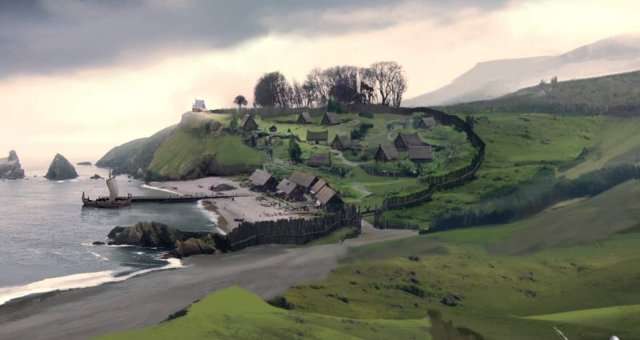
Before you play the Expeditions: Vikings game, you will definitely want to know these simple but useful tips and tricks. If you have any tips feel free to share with us!
Things to Know Before Playing
Like the first game, the game’s basic structure is separated into two parts: a shorter campaign in Denmark where you prepare for your expedition, and a longer campaign in Britain and the surrounding seas for your actual expedition. Unlike the first game, the game has a very specific timeline, and you will get an instant game-over if you don’t leave/return to Denmark in time. Importantly, there’s no benefit to leaving Denmark early, as the second campaign always starts at the same time and last the same length. Spend as much time as possible gathering/trading for supplies in Denmark as you can before leaving.
Although you will leave the first campaign with 10 characters, and can recruit more in the second, you can only ever have 6 people with you in your battle party, one of whom is always your main character. It is perfectly reasonable to have designated support characters with nothing but support and camping skills – the customized mercenaries you can recruit as part of your preparations are a good option here, and having one who does nothing but repairing/blacksmithing is honestly recommended since it’s skill point intensive and NPC blacksmiths are so expensive.
Do not be afraid of minmaxing. There is literally one character in the game without a 9/10 in their main combat stat, and he is noticeably worse off for it.
Skill checks are automatic if you have the required skill level; stat checks work by checking your stat against a random generated number and seeing if it’s equal to or less than your stat. Easy checks range from 1-4, medium from 5-7, and hard from 8-10; 4, 7, and 10 are thus the stat breakpoints for automatic success at that level. A stat that’s too low for the check to be possible has a minimum 5% chance of success.
- Stealing (red hand on item pickup) is a Finesse check of a difficulty stated when you try to take the item. Per the above, if you have 7 Finesse, feel free to steal every easy or medium item you see.
- The single most important defensive measure is a shield. Every single battle character should have a one-handed weapon and a shield in their first weapon set (so they’ll have it equipped if you’re ambushed); and if it’s not their main weapon, they should switch back to it on any turn they’re not attacking (sprinting, using support skills, etc.).
- The second most important defensive measure is mental/physical resistances. Leadership (unlocked at Sense 4) is a worthwhile investment of spare points to get some extra boosts, even for people who won’t be using its skills. Prioritize it on your ranged characters: enemies love to try and demoralize your party, and losing half your accuracy is basically a lost turn on many characters.
- Morale changes on the world map affect everyone in your hird; morale changes on the small maps only affect the 5 people you have in your party (your MC is always at max morale). Unlike the first game, desertion isn’t a thing, so don’t worry about trying to rotate characters to max morale on anyone who isn’t seeing combat.
- A piece of equipment’s durability is literally the sum of its stats, and every point of damage it takes is a point off of its stats. Once you get a blacksmith character, keep your active gear at max durability as much as possible.
- Thralls are build-time. Build-time is the primary way of gaining Power and Prosperity. Power and Prosperity is how you ultimately win the game (focus on one over the other if you want to reach 100). You can still win without taking/buying thralls, but you will likely not be able to build everything, and you should consider it to be the self-inflicted challenge it is.
- The time skip at the end of the first campaign lasts long enough to automatically complete whatever project you have going, regardless of when you ended or how long it had left.
- Many of the quests pointedly have no “best” ending, or conflict with endings from other quests, or so on and so forth. Accept it and move on. Corollary: if your definition of best ending is “the one where I murder everyone involved and take all their stuff”, then ignore this, that’s pretty much always an option.
- Non-lethal attacks are a toggle, and disable critical hits when switched on. It is very easy to forget about it between combats, so please make sure you pay attention to which setting it’s on before attacking.


Be the first to comment